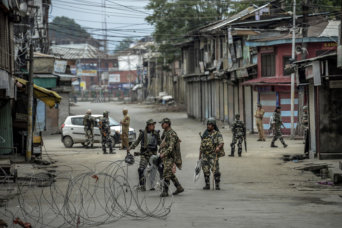- About
- Topics
- Picks
- Audio
- Story
- In-Depth
- Opinion
- News
- Donate
- Signup for our newsletterOur Editors' Best Picks.Send
Read, Debate: Engage.
| topic: | Political violence |
|---|---|
| located: | India |
| editor: | Shadi Khan Saif |
Only a renewed spate of violence and another generation of youth lost to fanaticism born out of desperation and oppression are on the cards for millions, due to the continued siege of Kashmiris by the New Delhi government in the Indian-Administered valley.
It has been almost two months since Prime Minister Narendra Modi-led government in India laid siege to the valley aimed at ending its long-held Special Status within the official structure of governance in the country.
Just last week, the death of an Indian born-and-raised “global terrorist” was announced following a night raid by the Afghan and U.S. forces in the restive Helmand province of the war-ravaged country.
Asim Omar, the leader of Al Qaeda's South Asian branch, was killed in a U.S.-Afghan joint airstrike in Musa Qala district in Afghanistan’s southern Helmand province in September. Maulana Asim Omar was a resident of Sambhal, Uttar Pradesh in India, and migrated to Pakistan in 1990. According to reports in the local media, Asim Omar led Al Qaeda in the Indian Subcontinent (AQIS) from its inception in 2014. He was killed during a raid on September 23.
India has long cherished its democratic values and moderate Islam practised by millions of its citizens across a country of over a billion people.
There is every possibility that the use of force in Kashmir – the only Indian state with a Muslim majority – would cause unrest and might well spark feelings of resentment among the Muslims likely to be exploited by the fanatics and extremist groups.
Let’s go a few decades back in history when the Soviet forces raided Afghanistan while calls for a religious war ‘Jehad’ against the Red Army rejuvenated various groups across the world, including Kashmir.
The beautiful valley has always given the image of a war-zone. With its many military check posts and armed police patrol remaining in the lockdown as both India and Pakistan view and approach this humanitarian issue from a strategic angle, while the main Kashmiri stakeholders continue to be taken out of the perspective.
Indians must not let their future be ruined for the sake of a populist move aimed at short-term electoral gains and sowing the seeds of hatred and extremism.

